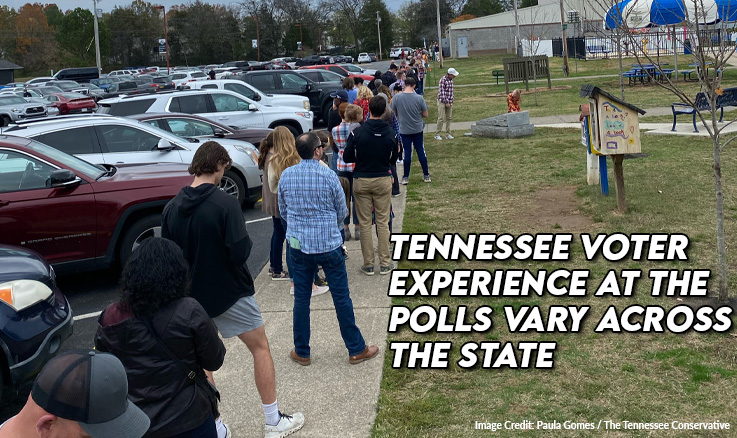Image: Polling Place in Wilson County on Election Day Image Credit: Paula Gomes / The Tennessee Conservative
The Tennessee Conservative [By Jason Vaughn] –
On election day, voters in several Tennessee counties were reporting that some polling stations were having trouble printing ballots. While many reported that all seemed well, some voters reported issues with not only paper ballots, but also with voting machines, open WIFI connections at polling places and more.
Danelle Nickels Pappenheim said that in Knox County at the Solway Church of God polling place, they ran out of ballots, then began printing ballots but then the printer ran out of ink/toner. “Paper ballots were used for a ‘hand’ count,” Pappenheim reports.
Another Knox county voter, Beverly Watson states that there was only one registration table and one printer at the Bearden Middle School polling place in Knoxville until 3:30.
“Hundreds of people in line. Took me two and a half hours to vote,” Watson said.
Paul Jackson Hodge said at Bearden High in Knoxville, there were paper ballots but no pens.
“No workers were checking IDs when I signed in. I later saw one check an ID but consistency did not exist. The ‘official poll observer’ was seated in back observing his phone. I spoke to the election official on site, the county commission, the State commission and my Representatives office. I was told it was addressed. My concern is how many got to vote illegally before I raised the red flag,” Hodge said.

Dekalb County voter, Marie Julie, reports that her polling place was using Dominion voting machines and that the site had an open WIFI connection.
Jenni Ferdorka states that in Montgomery County they had “machines with electronics and pushing a red button, no paper, no way to know if they Jimmy rigged my vote or not.”
A Hamilton County voter reports that one of the machines at the Christ United Methodist Church polling place in Chattanooga was “non-working.” He also reports that the polling place had an open WIFI connection.
Another Chattanoogan, Natalie Archer, said about her voting experience, “I moved here from California. Most secure I could have experienced.”
Jim Smith said it was “smooth sailing” in Etowah.
Carol Ewing said that voting in Hawkins County was all computerized at the Carter’s Valley Elementary polling place in Church Hill.
“No ballot that I saw printed out. I just pressed the red button to finalize my vote. I hope it wasn’t a Dominion machine. I hear some locations still use them,” Ewing said.
Doug Mitchell said that all was “smooth and painless” in Roane County.
Patti Wheetman reports that in Jefferson County’s District 1, everything “was perfection!”
“Everyone had to have an ID and everything done electronically,” Wheetman said, “Election volunteers were accessible for anyone needing help and they were all alert and doing a great job!”
Corrine Carlman reports, “No issues at Eagleton School in Maryville.”
“I had no problem voting in Monroe County,” Andi Pelkey said.

The Heritage Foundation recently ranked Tennessee as #1 on their Election Integrity scorecard, a point that has been touted across the state by politicians and other elected officials.
However, some say the Heritage Foundation missed the mark with their scorecard.
Grassroots groups Tennessee Voters for Election Integrity, Elections Future Alliance of Tennessee, Tennessee Liberty Network, Friends of Hamilton and Patriots Engage point out that the scorecard only looks at one aspect of election integrity – legislation governing elections.
The groups state that this results in “an incomplete and misleading picture of our state’s electoral health and giving citizens a false sense of security.”
The scorecard gave Tennessee a “0” on election litigation. The groups state that “maybe that’s because a lot of election integrity bills submitted to the 2022 General Assembly never made it out of subcommittees.”
The groups highlight several bills that died in subcommittees:
• HB2074, which would have given citizens the option for hand-marked ballots with security markings.
• HB2305, which would have established a state crime team to help local law enforcement catch and punish those who violate election rules.
•HB 2011, which would have filled an accountability gap by establishing a formal process in which a citizen could file a complaint with the State Election Commission (SEC) “alleging malfeasance or neglect of duty by a member of the state election commission or a county election commissioner.”
The groups also point out that Tennessee received a perfect score from Heritage on citizenship, yet “the state does not mandate authorized Registrars to request proof of citizenship or consult the Systematic Alien Verification for Entitlement (SAVE) program database at registration to ensure voters are eligible citizens.”
The scorecard also doesn’t address the “proven liabilities in the voting machines, the total lack of transparency by voting machine vendors or the administration of elections.”
In an interview with The Tennessee Conservative, Kathy Harms discussed how election integrity is being compromised in Tennessee.
Working alongside statisticians, IT specialists, cyber security experts, and legislators, Harms discovered that, despite good intentions, the current voting systems in Tennessee contain significant vulnerabilities.
Judging from the comments of voters from the midterm election on Tuesday and the researching done by the groups and individuals mentioned above, it would appear that Tennessee still has some work to do before all voters can feel confident that the Volunteer State’s election process is secure and trustworthy.


About the Author: Jason Vaughn, Media Coordinator for The Tennessee Conservative ~ Jason previously worked for a legacy publishing company based in Crossville, TN in a variety of roles through his career. Most recently, he served as Deputy Director for their flagship publication. Prior, he was a freelance journalist writing articles that appeared in the Herald Citizen, the Crossville Chronicle and The Oracle among others. He graduated from Tennessee Technological University with a Bachelor’s in English-Journalism, with minors in Broadcast Journalism and History. Contact Jason at news@TennesseeConservativeNews.com




3 Responses
In Blount County we follow all the rules. I was a poll worker in the primaries. However, in spite of doing everything right, the fact is that ANY machine can be hacked. I’ve listened to testimony before Congress by computer programmers and technicians who testify to this fact. We are simply choosing to ignore the experts and the obvious if we believe these machines are making elections safe and secure. They are not.
Every polling place at a Knox county school had unsecured WiFi I’d like to see what equipment was logged onto the WiFi? To me using a school’s WiFi would be the perfect smoke screen to do whatever.
The machines with the “red button” are made by MicroVote. One of the five different machines that Tennessee uses. The MicroVote software is proprietary and has no oversight at all. Every election these machines would have to be reprogrammed with the latest ballot information at a minimum. This also means we keep paying the vendors for this service regardless of who owns them. There is no ballot with MicroVote. It prints your selection on a self enclosed roll of paper that you must verify for accuracy, using a small window, along with a QR code. Obviously you can’t verify this QR code, only the vendor can. If there is a question about your ballot in the future the QR code is used. Hopefully this QR code matches what our vote was supposed to be. The machines do all of the tabulating individually which would be downloaded by a MicroVote contractor for further tabulation.